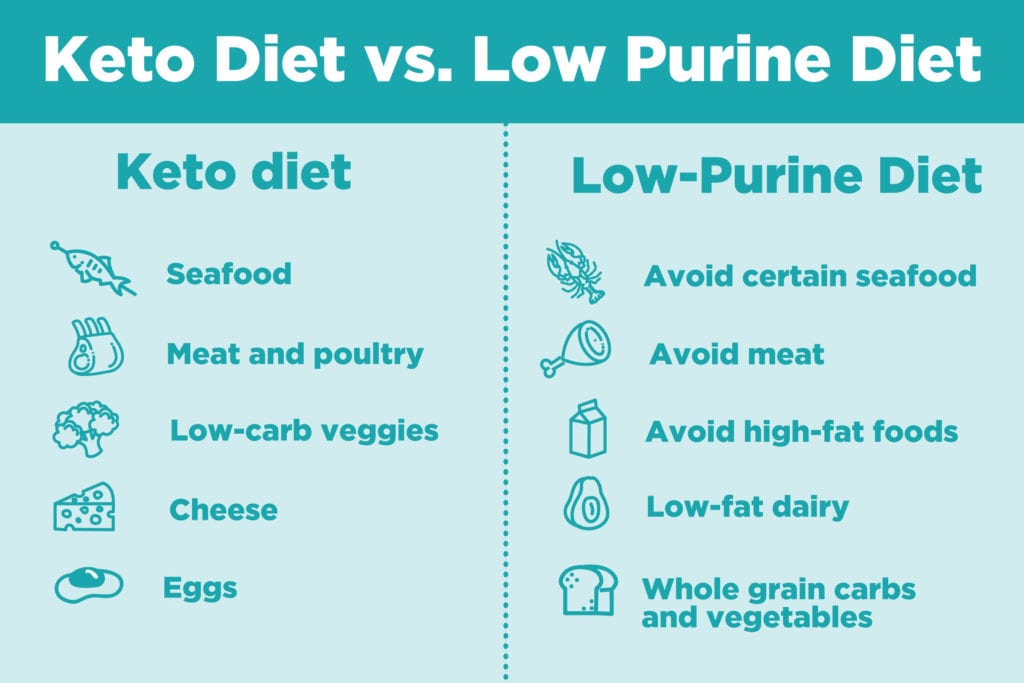What if your favorite diet trend could actually cause you intense pain? The ketogenic diet, revered for its effectiveness in weight loss and metabolic health, might have a hidden downside. Recent observations suggest that keto could potentially precipitate gout flare-ups, especially in individuals predisposed to the condition.
Historically, gout was known as the “disease of kings,” linked to rich diets that included excess meats and alcohol. Today, the keto diet’s high-fat and moderate-protein regimen might mirror this indulgence. Studies indicate that rapid weight loss and altered metabolic states on keto can increase uric acid levels, triggering painful gout attacks in susceptible individuals.

Interpreting the Keto Diet and its Principles
The Keto diet is a high-fat, low-carbohydrate eating plan. Its purpose is to push the body into a state of ketosis. When in ketosis, the body burns fat instead of carbs for energy.
To achieve ketosis, followers eat foods like meat, cheese, and nuts. Avoiding carbohydrates is crucial. This means skipping bread, pasta, and sugar.
The diet mimics the fasting state. This trick helps in weight loss by using stored body fat as fuel. This can lead to rapid weight loss.
Maintaining this diet can be challenging. It requires strict monitoring of food intake. However, many find the results worth the effort.
Keto Diet and its Potential Side Effects
While the Keto diet has gained popularity for weight loss, it isn’t without its side effects. These effects can range from mild to severe. It’s essential to be aware of them before starting.
Common Side Effects
One of the most frequently reported issues is the “Keto flu.” Symptoms include headaches, fatigue, and nausea. These usually occur as the body adjusts to low-carb intake.
Constipation is another common problem. This diet’s low fiber content from limited fruit and grain consumption can cause it. Drinking plenty of water can help mitigate this issue.
Some people experience bad breath, often described as fruity or metallic. This is due to ketones released in the breath. It can be managed with good oral hygiene.
More Serious Side Effects
Long-term adherence to the Keto diet can impact liver health. The liver processes fat, and a high-fat diet stresses it. It’s crucial to monitor liver function during the diet.
Kidney stones are a risk due to the high protein intake. Proteins load the kidneys with excess uric acid. Staying well-hydrated can help minimize this risk.
Increased cholesterol levels are another potential problem. The Keto diet encourages intake of fatty foods like meat and dairy. Regular cholesterol checks are advised.
Psychological Side Effects
Some individuals report mood swings. The lack of carbs can affect serotonin levels. This can lead to irritability and depression.
Difficulty in social situations is another challenge. Many social events revolve around food that isn’t Keto-friendly. This can make following the diet isolating and stressful.
Lastly, maintaining the diet requires constant monitoring. This can be mentally exhausting. For some, the diet may become an obsession, leading to an unhealthy relationship with food.
Understanding Gout: A Brief Overview
Gout is a type of arthritis that causes severe joint pain, often in the big toe. The pain is sudden and intense. Swelling, redness, and warmth in the affected joint usually follow.
Gout occurs when uric acid builds up in the blood. Uric acid is a waste product formed from breaking down purines, found in many foods. When the kidneys fail to eliminate enough uric acid, it forms sharp crystals in the joints.
Gout attacks can last a few days to a week. They can recur if not managed properly. Triggers include certain foods, alcohol, and stress.
- Common gout triggers:
- Red meat
- Seafood
- Alcohol, especially beer
- Sugary drinks
Managing gout involves lifestyle changes and medication. Eating a low-purine diet is crucial. Medications can reduce pain and lower uric acid levels.
Connecting Keto Diet and Gout: The Role of Uric Acid
The connection between the Keto diet and gout lies in uric acid levels. The Keto diet can cause rapid weight loss, which increases uric acid in the bloodstream. This elevated uric acid may lead to gout attacks.
When on a Keto diet, high-fat foods and proteins are heavily consumed. These foods can contribute to uric acid buildup. The body sometimes struggles to eliminate this excess uric acid efficiently.
Furthermore, ketosis may reduce the amount of urinary citrate. Citrate helps to lower the formation of kidney stones. Its reduction can indirectly affect uric acid levels.
People with a history of gout should be cautious. It’s essential to monitor uric acid levels while on a Keto diet. Regular blood tests can be helpful to keep these levels in check.
Maintaining hydration is crucial. Drinking plenty of water helps the kidneys flush out uric acid. This can minimize the risk of gout flare-ups.
Modifying the diet to include more vegetables and low-purine foods can also help. Keeping a balanced approach ensures that the benefits of Keto are enjoyed without compromising health.
Research Insights: Evaluating the Risk of Gout on Keto Diet
Several studies have explored the potential link between the Keto diet and gout risk. Some research suggests that the diet may increase uric acid levels. This increase can potentially trigger gout attacks in those predisposed to the condition.
| Study | Findings | Participants |
|---|---|---|
| Study A | Increased uric acid levels on Keto | 50 adults |
| Study B | No significant change in uric acid levels | 70 adults |
In another study, participants on a Keto diet exhibited higher incidences of gout attacks. However, it’s important to note that not all studies agree. Some research found no significant difference in gout risk.
The mixed results suggest that individual responses to the Keto diet can vary. Factors such as genetics, overall health, and specific diet adherence level may influence outcomes. Customized diet plans could be beneficial for managing gout risk on Keto.
Healthcare professionals recommend regular monitoring. Keeping a check on uric acid levels can help manage risks effectively. Consulting a healthcare provider before starting the Keto diet is also advisable.
Striking a Balance: Keto Diet and Gout Prevention
Finding the right balance while following the Keto diet is crucial for preventing gout. Incorporating gout-friendly practices can help mitigate the risks. It’s possible to enjoy the benefits of Keto without triggering gout.
Hydration plays a vital role in gout prevention. Drinking plenty of water helps flush out excess uric acid. Aim for at least eight glasses a day.
- Useful tips for staying hydrated:
- Carry a water bottle
- Set reminders to drink water
- Include hydrating foods like cucumbers
Another way to manage gout risk is by including low-purine foods. Vegetables, dairy, and certain nuts can be great additions to your Keto plan. Avoiding red meats and alcohol is also beneficial.
Regular monitoring of uric acid levels is essential. This helps in early detection of any imbalances. Schedule blood tests as recommended by your healthcare provider.
Consider integrating supplements that aid kidney function. Supplements like citrate may help control uric acid levels. Always consult your doctor before starting any new supplements.
Adhering to these guidelines can help strike a balance. Enjoying the benefits of Keto while preventing gout is achievable with the right approach. Monitoring and adjusting your diet is key.
Key Takeaways
- The Keto diet can raise uric acid, leading to gout risk.
- Rapid weight loss on Keto might trigger gout in some individuals.
- Eating high-protein foods increases uric acid levels.
- People with a gout history should monitor their health while on Keto.
- Consult a doctor before starting the Keto diet if prone to gout.

Frequently Asked Questions
If you’ve been exploring the Keto diet, you may have questions about its connection to gout. Here are some commonly asked questions answered to help clear things up.
1. How does the Keto diet affect uric acid levels?
The Keto diet can lead to higher uric acid levels. This happens because of increased consumption of protein-rich foods, which produce more purines.
More purines mean more uric acid in your bloodstream. Your kidneys might struggle to eliminate this excess, leading to crystal formation.
2. Can I follow a Keto diet if I have a history of gout?
You can follow a Keto diet with a history of gout, but it requires caution. Monitoring your uric acid levels regularly is crucial.
It’s recommended to consult your doctor before starting the diet. This way, you can tailor it to minimize risks specific to your condition.
3. What foods should I avoid on Keto if I’m prone to gout?
Avoid high-purine foods like red meat and seafood on Keto if you’re prone to gout. These foods increase uric acid production quickly.
Instead, focus on low-purine options like eggs and certain vegetables. Staying hydrated also helps flush out excess uric acid.
4. Are there any supplements that can help reduce gout risk on Keto?
Supplements such as citrate can help reduce the risk of kidney stones and lower uric acid levels. Always consult your healthcare provider before starting any new supplement regimen.
Some people also find that taking vitamin C supplements assists in lowering blood uric acid levels, providing another layer of prevention.
5. Why does rapid weight loss on the Keto diet trigger gout attacks?
Rapid weight loss releases stored fat cells into your bloodstream. These cells carry purines that increase uric acid production.
This sudden rise in uric acid elevates the risk of crystal formation in joints, triggering painful gout attacks for some individuals.

Final Thoughts
Understanding the relationship between the Keto diet and gout is essential for managing your health. While the Keto diet offers many benefits, it’s crucial to be aware of the potential risks, especially for those prone to gout. Ongoing monitoring and adjustments can make a significant difference.
Engaging with healthcare professionals for personalized advice is always recommended. They can guide you in balancing diet benefits while minimizing gout risks. Ultimately, striking the right balance will allow you to reap the rewards of the Keto diet safely.
